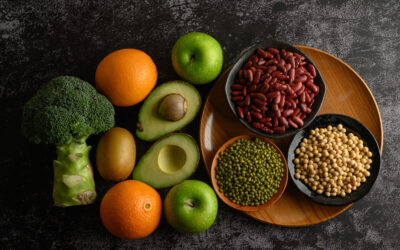Switching to plant-based proteins offers a powerful way to improve health, reduce environmental impact, and boost muscle and energy levels. Unlike animal protein sources, plant-based proteins are rich in fibre, vitamins, minerals, and antioxidants while being gentler on digestion and the planet. In today’s blog, we explore the key benefits of plant-based proteins, offer meal ideas, and show how to include them in your diet with ease.
Learn more about my holistic approach to food and well-being at My Philosophy.

Why Choose Plant-Based Proteins?
💪 Health & Digestive Benefits
- High in fibre – Many plant-based proteins support gut health and regular digestion.
- Lower in saturated fat – Linked to better heart health than animal proteins.
- Rich in phytonutrients – Beans, lentils and soy contain antioxidants and anti-inflammatory properties.
Need help with digestion-focused meal planning? Explore my Personalised Nutrition Packages.

🌍 Environmental Sustainability
Plant-based proteins require less water, land, and energy than livestock, reducing greenhouse emissions. Choosing plant over meat supports more sustainable agriculture, plus, you can grow nutrient-dense Tower Garden produce at home for better food independence. Learn more here: Tower Garden.

Top Plant-Based Protein Sources
| Food Source | Protein per Serving | Benefits |
| Lentils | ~18 g per cup | High in fibre, vitamins, and minerals |
| Chickpeas | ~15 g per cup | Versatile: curries, salads, hummus |
| Quinoa | ~8 g per cup | Complete protein with all amino acids |
| Tofu/Tempeh | ~15–20 g per ½ cup | Fermented or soy-based for versatile cooking |
| Nuts & Seeds | ~5–8 g per small handful | Healthy fats for satiety and energy |
| Peas & Edamame | 8–11 g per ½ cup | Fibre-rich and gut-friendly protein |
These plant-based proteins are building blocks for delicious, sustainable meals.
Meal Ideas Featuring Plant-Based Proteins
- Proteined Chickpea Salad Bowl
- Chickpeas, quinoa, leafy greens, avocado, olive oil and lemon dressing.
- Lentil & Veggie Stew
- Lentils with mixed Tower Garden vegetables, herbs, and spices for gut-friendly comfort.
- Tofu Stir-Fry
- Marinated tofu stir-fried with colourful peppers, broccoli, and brown rice.
- Overnight Oats with Chia & Nuts
- Whole oats, chia seeds, plant-based milk, nuts and berries, balanced with plant-based proteins and fibre to keep you full.
These recipes deliver protein, nutrients, and satisfaction with ease.

Tips for Seamless Incorporation
- Mix protein sources: Combine grains and legumes (e.g. rice and beans) to enhance amino acid profile.
- Prep in batches: Cook big pots of beans or lentils to use across meals.
- Sprinkle seeds: Add hemp, chia, or flax, rich in protein and omega-3s, to smoothies or salads.
- Use plant-based protein powders: Great for smoothies post-workout or as a quick protein boost.
Explore nutrition-focused plans that include plant-based meals in my Programmes.

Addressing Common Concerns
- Protein Sufficiency: Ensure adequate total protein by including varied plant sources across the day.
- Digestibility: Soak beans and lentils or cook well to ease digestion.
- Taste Preferences: Try marinating tofu, using bold spices, or incorporating dips like hummus.

Why We Love Plant-Based Proteins
- Intuitive digestion and natural energy
- Support for muscle recovery and movement
- Gentler on the planet and sustainable
- Packed with nutrients beyond just protein

Your Next Steps
Incorporate more plant-based proteins to enhance your health and contribute positively to the environment. Want to customise these tips for your lifestyle?



